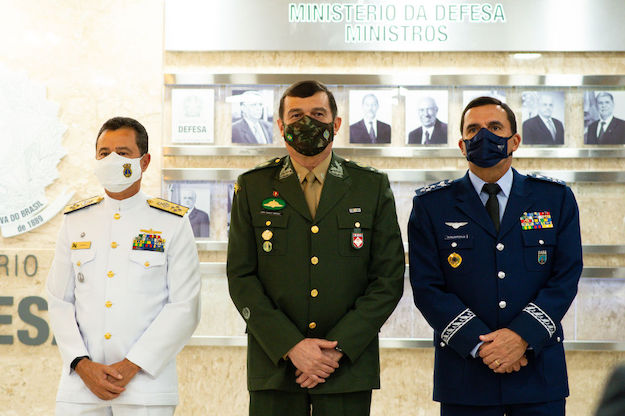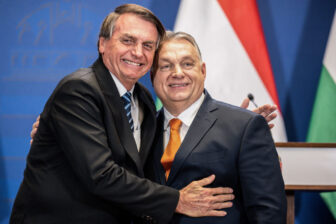For the first time since Brazil transitioned to democracy in the late 1980s, a cloud of uncertainty is hovering over the upcoming presidential election in the world’s fifth-largest democracy. Ten months ahead of the first round on October 2, political analysts not only wonder who will win, but also whether President Bolsonaro will attempt to obstruct the transition of power if he loses to former President Luiz Inácio Lula da Silva, as polls currently suggest.
A quick concession and congratulatory call by a defeated Bolsonaro to his opponent, as Argentine incumbent Mauricio Macri did in 2019, can almost certainly be ruled out. Even optimists do not believe Bolsonaro would appear at Lula’s inaugural ceremony to hand over the presidential sash. A best-case scenario might be Argentina’s somewhat turbulent transition of power from Cristina Fernández de Kirchner to Macri in 2015: After a public disagreement between the incoming and outgoing leaders about the logistics of the transition, Kirchner resigned on her last day in office, stayed away from the inaugural ceremony and did not hand Macri the presidential sash and baton. She did not, however, seek to sabotage the transition itself.
Given the Bolsonaro family’s proximity to Donald Trump and the Brazilian president’s firm belief that the U.S. election was rigged, a Brazilian “January 6 scenario” – a refusal to concede by the incumbent and a clumsy but ultimately failed attempt to stop the transition, marked by some political violence – may still count as a benign outcome.
Yet no analysis of what may happen if Bolsonaro tries to steal the election can be complete without taking into consideration how Brazil’s armed forces and military police would react in such a scenario. In fact, it is no exaggeration to say that the country’s armed forces, which have accumulated an enormous amount of political power under the current administration, are set to be the key power brokers if Lula defeats Bolsonaro.
Predicting the reaction of the military and the military police is difficult, in part because the armed forces are not a cohesive unit and because those who make public statements do not necessarily represent the institution. Bolsonaro’s decision to suddenly sack his minister of defense last March, causing the heads of Brazil’s army, navy and air force to resign in protest, was largely seen an attempt to surround himself with loyalists. New Defense Minister Braga Netto is seen as so unfailingly loyal to Bolsonaro that the president even considered picking him as his running mate for reelection.
Yet a lot will depend on the specific circumstances of the elections. If Lula were to win by a large margin, similar to the victory Bolsonaro celebrated in 2018 (when he obtained nearly 58 million votes against 47 million for his opponent, Fernando Haddad), even the most radical coup-mongers among the generals would probably not try to intervene in the result. A close Lula victory remains more likely, and the risk of Bolsonaro not only refusing to concede, but also actively obstructing the transition of power, increases markedly if the difference between victory and defeat is less than a million votes.
There are numerous signs that the commitment of Brazil’s armed forces and the military police to democracy is ambiguous at best. While Chairman of the Joint Chiefs of Staff Mark Milley announced, during the tense aftermath of the 2020 U.S. elections, that “we take an oath to the Constitution, not an individual,” glorifying the dictatorship remains common among Brazil’s military, and the generals have offered little pushback against the Bolsonaro’s authoritarian antics, which came to a head last September, when he publicly vowed to defy the decisions by a Supreme Court judge. In the same way, leading generals have remained largely quiet in the face of President Bolsonaro’s frequent attempts to cast doubt on the legitimacy of Brazil’s voting system, even though they are almost certainly a prelude to questioning the results if necessary.
To the armed forces, a Bolsonaro defeat would imply a loss of political power and ample perks. After all, the countless military officers who currently occupy political posts across the Bolsonaro administration or government-owned companies often accumulate salaries. Yet the return of Lula would be particularly irksome to both generals and lower-ranking officers. Many dislike the Workers’ Party (PT) for its key role in consolidating civilian control over the armed forces, but even more so for its creation of a National Truth Commission which, despite lacking teeth, shone an uncomfortable light on the army’s role during the dictatorship and was seen as a retaliation. Not even the fact that the largest military deals in Brazil’s history were signed under Workers’ Party governments – involving the purchase of helicopters, fighter jets and submarines from France – kept numerous military leaders from enthusiastically supporting Bolsonaro’s radical anti-PT stance.
While Lula himself may not be able to establish a productive dialogue with the generals and military police ahead of the elections, he is already striking alliances with those who can assuage fears among the armed forces. For example, picking Geraldo Alckmin as running mate would allow Lula to gain the support of former São Paulo governor Márcio França, who is highly respected by the state’s police, a hotbed of pro-Bolsonaro sentiment. In the same way, the Lula campaign can be expected to signal, behind closed doors, that it will refrain from punishing or sidelining the armed forces entirely for having supported Bolsonaro – a tendency epitomized by former army chief Villas Bôas’s notorious tweet in 2018 threatening military intervention if the Supreme Court decided to keep Lula out of prison. But for many members of the military, President Bolsonaro’s habit of calling the institution “my” armed forces has left a sour taste. And Brazil could see politically inclined military personnel choose a different path: running for office themselves.









